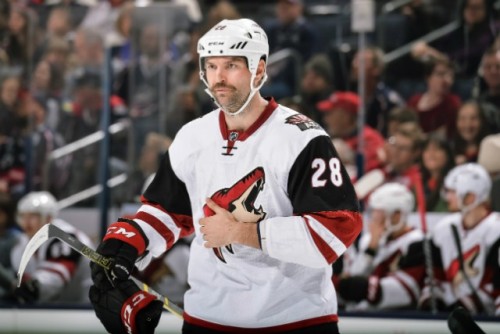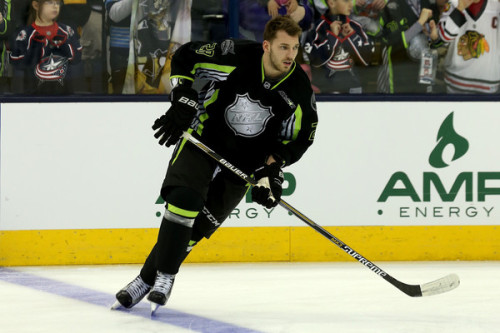Why “Captain” John Scott may be good for the NHL All-Star game

The All-Star game is a joke.
There’s no way around it, really – only Major League Baseball has come close to creating an event that brings together the league’s best and most popular players (two titles often wrongly thought of as synonymous) in a format that doesn’t totally repulse its fans. Sure the home run derby is a gimmick, but its excitement is matched only by the significance of the game itself.
While the MLB has seemingly found a winning formula, the other major sports leagues (including the National Hockey League) have grappled with a loaded question that has no easy answer: How do you take an obviously unnatural event and a) market it to the fans as something natural and enjoyable, while b) ensuring the quality of the product is able to live up to the hype?
The NHL has, over the years, experimented with an assortment of formats to varying degrees of success since the first All-Star game in 1947. For the first two decades of its existence the game featured the previous year’s Stanley Cup champion versus the All-Star team. Then, in 1969, the NHL adopted the East-West format (National vs. International from 1998-2002) that lasted until 2011, when the fantasy draft was introduced.
After that format failed to arouse any significant interest from the players and fans – apparently the pride of millionaire hockey players can be hurt by being picked last, even in a humorous draft – the league needed to find another way to ignite some of the passion surrounding the weekend that had gone dormant in the past decade. In a sense, John Scott is exactly what the NHL needed.
Similar to the way Zemgus Girgensons captured the hearts of Buffalo Sabres fans and the Latvian population last season, so Scott has garnered the interest of trolls in 2016. The only difference is Girgensons had 22 points at the All-Star break in 2015 – not among the league leaders, but still respectable compared to Scott’s single point through only 11 games this season.

Yes, Scott’s selection as captain of the Pacific Division (joining other division captains Patrick Kane, Alex Ovechkin and Jaromir Jagr) only confirms the All-Star festivities are a joke. But there is a positive: namely, that fans took enough interest in the outcome of the voting process to commit to selecting – as a starter, no less – an ill-deserving Scott.
The 3-on-3 tournament adopted for this season’s festivities is by no means conducive to Scott, who stands a menacing 6’8” 260 lbs. with a less-than-menacing skillset, but perhaps that’s part of the draw. Who isn’t intrigued by the thought of Scott (and whomever ends up alongside him) lining up against a potential trio of Patrice Bergeron, Erik Karlsson and PK Subban?
Despite the obvious one-sidedness of the matchup, seeing how Scott compares to the rest of the All-Stars is sure to grab plenty of eyeballs – and, in the end, isn’t that the goal? Sure, he might look like a fool in the process, but so long as he’s a willing fool – which Scott appears to be – it’s better than the alternative of deserving players declining to attend because of phantom injuries.
Maybe one-dimensional players who don’t bring much to the table (Scott), or sub-par players who have inspired breakout rap hits internationally (Girgensons…look it up) don’t fit the mould of the kind of participants the NHL is looking for in these games, but they create a level of excitement the league simply can’t drum up through its own means.
As a fan-driven event, the end goal of the All-Star game should be to get fans as involved in and excited about it as possible. So what if that goal is arrived at through not-so-traditional means? Perhaps it’s time the NHL – as its players and fans have already done – stops trying to brand the All-Star game as a serious event and just accepts it for the farce it is, John Scott and all.


